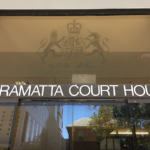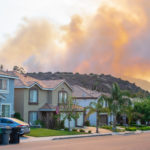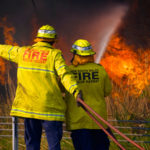The Offence of Intentionally or Recklessly Destroying or Damaging Property by Fire in NSW

It has been reported that at around 10.50pm on Saturday, police patrol officers observed a fire at a demountable building used for COVID-19 testing on Forrester Road in North St Marys, in the Penrith Local Government Area.
Police says the wall outside the building was scrawled with ‘anti-government and anti-COVID’ graffiti, including ‘COVID 19 is a lie’, ‘fight the system’, ‘fuck Gladys’ and ‘people revolt’.
Firefighters attended and extinguished the blaze which was engulfing the small structure.
Police believe the cause of the fire was the result of arson, but are yet to identify or locate the person or persons responsible.
Nepean Police Local Area Command Crime Manager Jason Peitruzka told the media:
“To be perfectly honest, obviously I think they’re quite ridiculous and quite pointless to engage in such conduct”
“To make such comments, and to engage in such activity is criminal and will be seriously frowned upon by the courts when that person is put before them.”
“It’s also very damaging to the community who rely on this testing clinic to assist with the health message and with their own health.”
The officer expressed concerns that the person responsible for the fire is “very likely to do it again”.
New South Wales Premier Gladys Berejiklian expressed her disappointment regarding the conduct:
“It is always disappointing when people ignore health advice or pretend that COVID-19 is not serious,” she stated.
“A number of people do have those views and demonstrate them from time to time and that is the threat of Delta.”
Police are appealing for help to find the person or persons responsible.
Intentionally or recklessly destroying or damaging property in New South Wales
Destroying or damaging property is an offence under section 195 of the Crimes Act 1900 which carries a maximum penalty of 5 years in prison in the District Court, or 2 years if the case remains in the Local Court.
To establish the offence, the prosecution must prove beyond a reasonable doubt that:
- The defendant destroyed or damaged property,
- The property belonged to another person, and
- The defendant intended to cause the destruction or damage or was reckless as to whether his or her actions would cause the destruction or damage.
A defendant is ‘reckless’ if he or she realised the conduct may possibly destroy or damage the property, but went ahead with the actions regardless.
Destroying or damaging property by fire with intent to cause injury
Under section 196 of the Crimes Act sets out the offence of destroy or damage property with the intention of causing injury to another person.
This offence is punishable by a maximum penalty of 14 years if the damage is caused by fire, or 16 years if this is done during a public disorder.
Dishonestly destroying or damaging property by fire
Under section 197 of the Crimes Act, a person commits an offence if he or she dishonestly destroy or damage property for financial gain.
This offence is punishable by a maximum of 7 years in prison, or 14 years if it is caused by fire or explosives.
The maximum increases to 9 years in prison if the act is committed during a public disorder, or 16 years if it is during a public disorder and caused by a fire or explosives.
The offence may encompass where the owner of a property causes a fire to that property in order to receive an insurance payout, or whether a business owner burns down a competitor’s premises to gain a financial advantage.
Defences to the charge
Where the evidence raises a valid legal defence, the prosecution must prove beyond reasonable doubt that the defence is not applicable.
If the prosecution is unable to do so, the defendant must be found not guilty.
The defences to destroy or damage property include:
- Self-Defence,
- Duress, and
- Necessity.
Sentencing considerations for damaging or destroying by fire
In the event that a defendant pleads guilty or is found guilty of a criminal charge such as intentionally or recklessly destroying or damaging property, the court is required to consider a range of factors when determining the appropriate penalty.
These sentencing factors are broad and are listed in section 21A of the Crimes (Sentencing Procedure) Act 1999 (NSW).
However, the case-law has made clear that the following factors are particularly relevant when it comes to sentencing offences that involve damaging or destroying property by fire:
- The extent of the damage caused: R v Elzakhem[2008] NSWCCA 31 at [45]; Porter v R at [56], including
- Whether it was caused to a limited public resource: R v Pittat [27], or
- Whether it involved “substantial loss and personal stress” to small business owners: Porter v Rat [83],
- The potential risk of injury to other people: Porter v Rat [80],
- The potential spread of the fire: R v Baker[2000] NSWCCA 85 at [16]:
- The state of the defendant’s knowledge regarding the financial effect of the conduct, including any knowledge the property was uninsured: R v Priest[2000] NSWCCA 27 at [14],
- The defendant’s motive for committing the act: R v Porterat [81], [84], and/or
- Th degree of planning and premeditation: R v Karibian[2007] NSWCCA 334 at [28].
The sentencing magistrate or judge has all sentencing options at his or her disposal when dealing with property damage cases, including:
- Section 10 dismissal,
- Conditional release order,
- Fine,
- Community correction order,
- Intensive correction order or, as a last resort:
- Prison.
Going to court?
If you are going to court over allegations of destroying or damaging property, call Sydney Criminal Lawyers anytime on (02) 9261 8881 for expert advice and formidable representation by our profession-leading criminal defence team.






